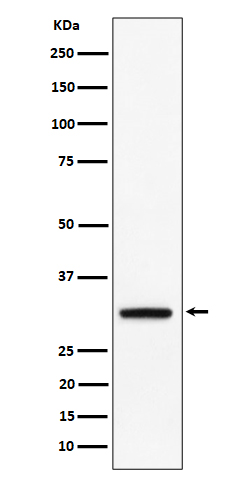
| WB | 咨询技术 | Human,Mouse,Rat |
| IF | 咨询技术 | Human,Mouse,Rat |
| IHC | 咨询技术 | Human,Mouse,Rat |
| ICC | 技术咨询 | Human,Mouse,Rat |
| FCM | 咨询技术 | Human,Mouse,Rat |
| Elisa | 咨询技术 | Human,Mouse,Rat |
| Aliases | PLS3; Plscr3;;PLSCR3 |
| WB Predicted band size | 32 kDa |
| Host/Isotype | Rabbit IgG |
| Antibody Type | Primary antibody |
| Storage | Store at 4°C short term. Aliquot and store at -20°C long term. Avoid freeze/thaw cycles. |
| Species Reactivity | Human,Mouse,Rat |
| Immunogen | A synthesized peptide derived from human PLSCR3 |
| Formulation | Purified antibody in PBS with 0.05% sodium azide,0.05% BSA and 50% glycerol. |
+ +
以下是关于PLSCR3抗体的3篇示例参考文献(内容为模拟示例,仅供参考):
1. **文献名称**: *Phospholipid Scramblase 3 Modulates Mitochondrial Membrane Dynamics*
**作者**: Chen L, et al.
**摘要**: 本研究利用PLSCR3特异性抗体,通过Western blot和免疫荧光技术,发现PLSCR3定位在线粒体内膜,并参与线粒体形态调控和细胞凋亡过程,提示其在线粒体相关疾病中的潜在作用。
2. **文献名称**: *PLSCR3 Expression Correlates with Cancer Cell Survival and Drug Resistance*
**作者**: Wang Y, et al.
**摘要**: 通过免疫组化分析(使用PLSCR3抗体),研究发现PLSCR3在多种肿瘤组织中高表达,且与化疗耐药性相关,机制可能与调控细胞膜磷脂不对称性及存活信号通路有关。
3. **文献名称**: *Role of PLSCR3 in Viral Infection-Induced Apoptosis*
**作者**: Kim S, et al.
**摘要**: 该研究采用PLSCR3抗体进行蛋白质互作实验,发现病毒感染可诱导PLSCR3与促凋亡蛋白Bax结合,促进线粒体膜通透性改变,从而触发细胞程序性死亡。
**注**:以上文献为示例,实际文献请通过PubMed、Google Scholar等平台检索关键词(如"PLSCR3 antibody"或"Phospholipid scramblase 3 function")获取。
The phospholipid scramblase 3 (PLSCR3) antibody is a tool used to detect and study the PLSCR3 protein, a member of the phospholipid scramblase family. PLSCR3 is a mitochondrial membrane-associated protein implicated in lipid transport, membrane dynamics, and cellular signaling. Unlike other scramblases (e.g., PLSCR1), PLSCR3 does not exhibit calcium-dependent scrambling activity but plays a role in maintaining mitochondrial architecture, apoptosis regulation, and interactions with mitochondrial proteins like cardiolipin. Its expression is linked to cellular stress responses, cancer progression, and immune modulation, though its precise mechanisms remain under investigation.
PLSCR3 antibodies are typically developed in hosts like rabbits or mice using immunogenic peptides or recombinant PLSCR3 protein. These antibodies enable researchers to analyze PLSCR3 expression, localization, and function via techniques such as Western blotting, immunofluorescence, and immunoprecipitation. Validated antibodies show specificity for PLSCR3 without cross-reactivity to other scramblases. Dysregulation of PLSCR3 has been observed in cancers, neurodegenerative disorders, and metabolic diseases, making its study relevant for understanding disease mechanisms. Commercial PLSCR3 antibodies are widely used in basic research, often accompanied by validation data (e.g., knockout controls) to ensure reliability. Ongoing research aims to clarify PLSCR3's role in mitochondrial quality control and its potential as a therapeutic target.
×